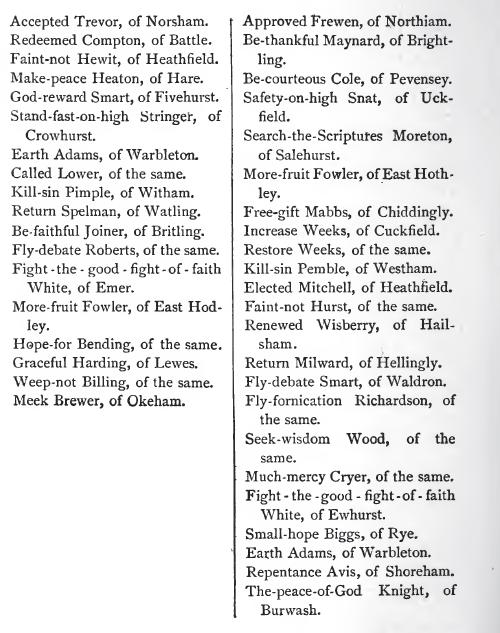Bizarre Seventeenth-Century Jury List May 7, 2015
Author: Beach Combing | in : Modern , trackbackThere follows a jury panel list from Sussex in the UK dating to the seventeenth century. A simple question: what is wrong with it? Beach has placed the forenames in bold and the surnames in italics: the final names are the local towns.
Accepted Trevor of Norsham
Redeemed Compton of Battle*
Faint-not Hewit of Heathfield
Make-peace Heaton of Hare
God-reward Smart of Fivehurst
Stand-fast-on-high Stringer of Crowhurst
Earth Adams of Warbleton
Called Lower of the same
Kill-sin Pimple of Witham
Return Spelman of Watling
Be-faithful Joiner of Britling
Fly-debate Roberts of the same
Fight-the-good-fight-of-faith White of Emer
More-fruit Fowler of East Hodley
Hope-for Bending of the same
Graceful Harding of Lewes
Weep-not Billing of the same
Meek Brewer of Okeham
The forenames are, to say the least, strange. These are so-called hortatory names, names occasionally used by English puritans in the sixteenth and, above all, the seventeenth century to celebrate their passion for Godly living: an amusing and aesthetically challenged period of British onomastics. This list first appeared in Travels over England, Scotland, and Wales by James Brome in 1700, but was made famous by its inclusion in Hume’s History of England (1754-1761) in a note. In the nineteenth-century the list was often dismissed as a forgery and a fairly clumsy one at that. But in 1897 Bardsley pointed out that the list was from Sussex, a strong puritan area, and an area where many puritan children were given hortatory names. For example, 43 percent of children were given hortatory (or as Bardsley called them ‘exhortatory’) names in the Sussex parish of Warbleton between 1570 and 1600, according to American historian David Hackett Fischer. What Beach finds extraordinary is that there are no ‘normal’ names. It is possible that Brome or his source edited these out as being uninteresting. Then the jury list, according to Brome, dated to the English Civil War and Commonwealth 1642-1661: ‘in the late rebellious troublesome times’, when perhaps puritans were more likely to serve? Whether so numerous a pool would have been asked to serve in juries in the seventeenth-century County Assizes is another question altogether and one that Beach has not been able to resolve: drbeachcombing AT yahoo DOT com
Is the list genuine? Bardsley sums it up nicely ‘The names are real enough; the panel is not necessarily so.’ Bardsley, in fact, finds other examples of almost all these names AND in one case actually finds the individual recorded in Sussex documents. The list below was, instead, discovered in the British Library by one ‘Mr Lower’. In this case Bardsley found three of the names in the record: signalled once more by an asterix. Again the jury lists might be concocted or misunderstood, but the names are absolutely convincing. The world turned upside down, indeed. Pass me the salt Peace-of-God, stop snoring Be-Courteous, oh shut the hell up Fly-Debate…
Enjoy!
Approved Frewen of Northiam*
Be-thankful Maynard of Brightling
Be-courteous Cole of Pevensey
Safety-on-high Snat of Uckfield
Search-the-Scriptures Moreton of Salehurst
More-fruit Fowler, of East Hothley
Free-gift Mabbs of Chiddingly*
Increase Weeks of Cuckfield.
Restore Weeks of the same*
Kill-sin Pemble of Westham
Elected Mitchell of Heathfield
Faint-not Hurst of the same
Renewed Wisberry of Hailsham
Return Milward of Hellingly
Fly-debate Smart of Waldron
Fly- fornication Richardson of the same
Seek-wisdom Wood of the same
Much-mercy Cryer of the same
Fight-the-good-fight-of-faith White of Ewhurst
Small-hope Biggs of Rye
Earth Adams of Warbleton
Repentance Avis of Shoreham
The-peace-of-God Knight of Burwash



